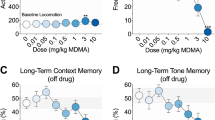Abstract
Rationale. Previous studies have indicated that the conditioned effects of environmental stimuli contribute to ethanol tolerance and abuse. Acamprosate was recently suggested to reduce the effects of environmental stimuli previously associated with ethanol administrations. This action is believed to contribute to the clinical benefits of acamprosate treatment in alcoholics.
Objectives. In the present experiment, a classical drug-conditioning paradigm was used to test whether acamprosate modulates the effects of ethanol-paired environmental stimuli on spontaneous motor activity.
Methods. Wistar rats were divided into three groups: cued, uncued and control. The cued group daily received ethanol injections (2.0 g/kg, IP) in a specific testing environment. The uncued group daily received ethanol injections (2.0 g/kg, IP) in their home cage but never experienced ethanol in the testing environment. The control group was injected with saline and never experienced ethanol. After 8 conditioning days, the rats were IP injected with various ethanol doses (saline, 1.0, 1.5 or 2.0 g/kg) and their spontaneous motor activity in the testing environment was recorded to investigate their respective tolerance to ethanol inhibitory effects. In the second part of the study, the same procedure was repeated with chronically acamprosate-treated rats. The chronic acamprosate treatment (400 mg/kg per day) started 2 weeks before the conditioning procedure by diluting acamprosate in the drinking bottles and was maintained throughout the whole experiment.
Results. The cued rats showed a significant environment-dependent tolerance to ethanol inhibitory effects relative to the uncued and control rats. This higher ethanol tolerance of the cued rats was mainly due to a faster recovery from ethanol's inhibitory effects on spontaneous activity. Furthermore, the cued rats showed a higher level of activity in the testing environment after the saline injection. However, it is not clear whether this hyperactivity is a conditioned compensatory response or an increased exploratory behavior. Acamprosate totally abolished the environment-dependent tolerance to ethanol, whereas it did not alter the hyperactivity of the cued rats in the testing environment.
Conclusions. The results of the present study suggest that acamprosate reduces ethanol-conditioned effects. Such an action may be of importance to explain the anti-relapse effects of acamprosate.
Similar content being viewed by others
Author information
Authors and Affiliations
Additional information
Electronic Publication
Rights and permissions
About this article
Cite this article
Quertemont, E., Brabant, C. & De Witte, P. Acamprosate reduces context-dependent ethanol effects. Psychopharmacology 164, 10–18 (2002). https://doi.org/10.1007/s00213-002-1186-z
Received:
Accepted:
Issue Date:
DOI: https://doi.org/10.1007/s00213-002-1186-z




